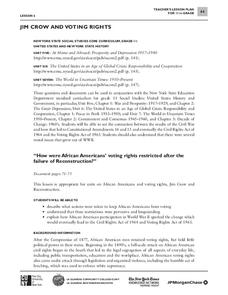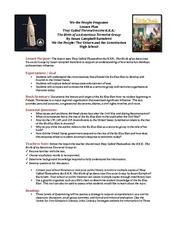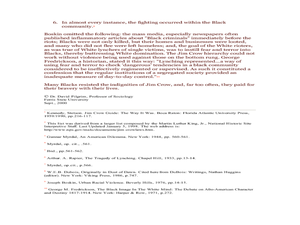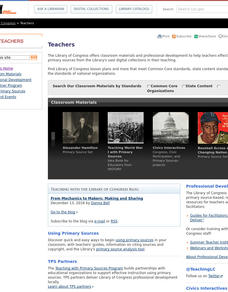Curated OER
Southern Perspective on Reconstruction
Students analyze historical perspectives. In this Reconstruction lesson, students compare and contrast the Northern and Southern views on Reconstruction as they analyze letters from Robert E. Lee and read Confederate Military History.
Curated OER
Need for Reconstruction: Devasation and Liberation in the South
Eighth graders examine the amount of destruction in the South following the Civil War. They explore the reasons why Reconstruction was needed.
Curated OER
Why Was It Difficult To "reconstruct the South"?
Students examine problems faced by the states of the Confederacy following the Civil war. They predict how Lincoln wanted to handle the problem of reconstruction by listening to his words. They describe conditions in the South...
Curated OER
A Lesson on Reconstruction Legislation and Amendments
Students study the legislation and Amendments of Reconstruction period in America. In this Reconstruction lesson, students work in groups to dissect the Black Codes, an article in the US Constitution, as well as the 13th, 14th, and 15th...
Curated OER
Reconstruction
Students describe the period of Reconstruction. Then students describe the concept of sharecropping. They complete a vocabulary prediction confirmation activity for the vocabulary words from the passage.
Curated OER
The Complexities of Reconstruction
Fourth graders critically analyze the social, economic, and political impact of the Federalization of the South. They develop a PowerPoint presentation relative to the Post Civil War South.
Carolina K-12
Plessy v. Ferguson & the Roots of Segregation
How far in the past do the roots of Jim Crow and segregation extend? Young historians closely consider this question using detailed PowerPoint slides as a basis for discussion rather than lecture, culminating in an activity where class...
City University of New York
Jim Crow and Voting Rights
Class groups examine primary source documents to determine how the voting rights of African Americans were restricted after the failure of Reconstruction, and how African American participation in World War II lead to change.
PBS
The Meaning of the Fourteenth Amendment
The Fourteenth Amendment was extremely important to civil rights and is a crucial one to remember. The resource teaches about the Supreme Court decisions related to the amendment through writing exercises, reading, and working in small...
US House of Representatives
“The Fifteenth Amendment in Flesh and Blood,” The Symbolic Generation of Black Americans in Congress, 1870–1887
The reading of a contextual essay launches a study of Black Americans who served in Congress from 1870 through 1887. Young historians identify the African Americans who served during this period, investigate the ways they won national...
Curated OER
Backward Lesson Plan
Students explore and analyze the position of freedmen in the post Civil War period as well as the impact of Andrew Johnson's presidency on Reconstruction. In addition, they evaluate the laws and amendments that were put in place during...
Curated OER
Where Do We Go From Here?
Eighth graders examine the impact of Reconstruction on South Carolina. In this Reconstruction lesson, 8th graders use primary documents to research sharecropping and freedman's contracts in the agricultural South following the end of...
Curated OER
African Americans after the Civil War
Students explore the events of Reconstruction after the Civil War. In this US History lesson, students complete several activities and worksheets that reinforce challenges and social upheaval experienced in the South after the Civil War.
Curated OER
Government Lesson Plan: Lesson Plan 8
Learners analyze the Fourteenth Amendment. They discuss Reconstruction, read the provisions of the Fourteenth Amendment, define the provisions, and in small groups analyze a Supreme Court case that was impacted by the due process clause.
Curated OER
The Called Themselves the K.K.K.; The Birth of an American Terrorist Group
How did Ku Klux Klan develop and flourish in the US? How did the government respond to acts of terrorism conducted by the KKK following the Civil War? How does the government respond to acts of terrorism today? This resource launches a...
Facing History and Ourselves
The World the War Made
The United States Civil War forced Northern and Southern societies, as well as the people who made up those societies, to reconstruct their vision of themselves and their identities. A series of video-based web lessons look at the great...
Facing History and Ourselves
Interracial Democracy
Radical Reconstruction, the 10-year period referred to after Congress passed the Reconstruction Act of 1867, saw the establishment of manhood suffrage, men voting without any racial qualifications. Southern states also rewrote their...
US House of Representatives
A Picture is Worth a Thousand Words
Groups select a photograph from one of the four eras of African Americans in Congress and develop a five-minute presentation that provides background information about the image as well as its historical significance. The class compares...
Center for History Education
African Americans and the Democratic Party
Why did African American voters switch from the Republican Party to the Democratic party during the Depression Era? That is the question young historians attempt to answer as they study primary source documents from the period. The focus...
Curated OER
The Rise and Fall of the Jim Crow Era
Students explore African American history by researching the Jim Crow laws. In this Civil Rights lesson, students define the Jim Crow laws, the reasons they were put into place, and how they were ultimately defeated. Students write a...
Curated OER
The New Deal: North Carolina's Reconstruction
Eighth graders study North Carolina's reconstruction through an interdisciplinary project that emcompasses social studies, language arts, visual art, music, and technology.
Curated OER
Slave Narratives: Constructing U.S. History Through Analyzing Primary Sources
Learners access oral histories that contain slave narratives from the Library of Congress. They describe the lives of former slaves, sample varied individual experiences and make generalizations about their research in journal entries.
Curated OER
Women and the Civil War Era
Students explore feminism and explore the different roles of women and how they have changed over time. They read books about women in this period and evaluate the past, observe the present, and make assumptions about the future.
Curated OER
Reconstruction and the 1868 South Carolina Constitution
Students, through lecture and group discussion, explore the American Civil War Reconstruction and how it affected the development of the 1868 Constitution of South Carolina. They discuss its impact on South Carolina even today.

























